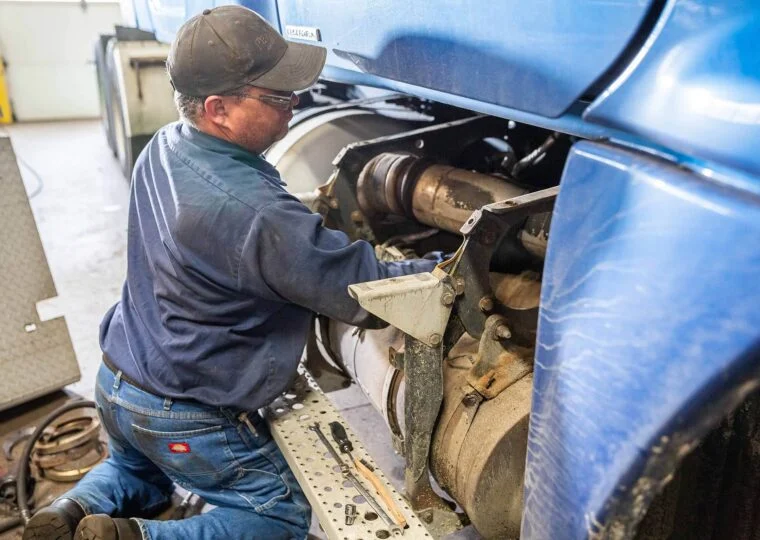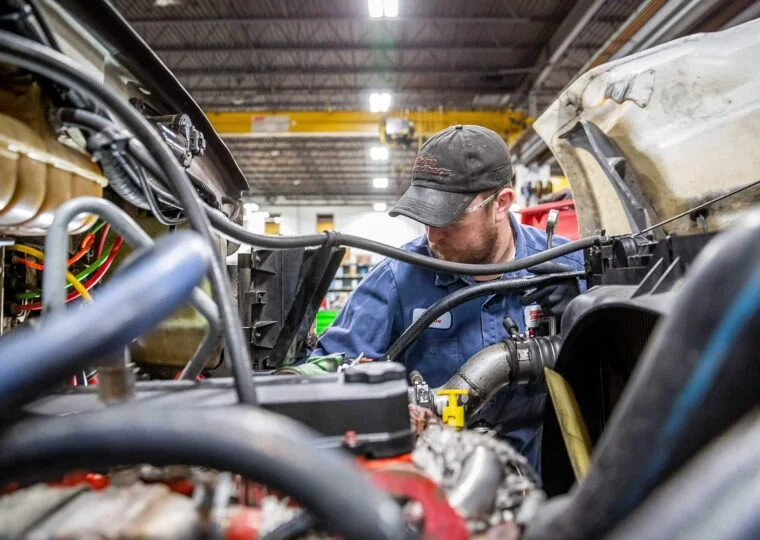Semi-trucks are the backbone of the entire domestic transportation industry. They carry goods from one end of the country to another, all while playing a significant role in the larger economy. With responsibility like this, it’s vital to make sure your truck is operating safely and efficiently. Keeping your semi-truck performing optimally means maximizing the effectiveness of all maintenance for fuel efficiency and overall lifespan.
In some cases, this maintenance can be done by the operator of the truck, but other maintenance items will need to be taken care of by a professional mechanic to ensure they are performed correctly by someone with experience. We’re going to dig into what critical maintenance for your semi-truck includes and how it can help. With just a few of the tips in this comprehensive guide, you should be able to make decisions for your semi-truck that will minimize costly repairs.
 Important Maintenance for Semi-Trucks
Important Maintenance for Semi-Trucks
Here’s a detailed rundown of what you can do for your truck, as well as what might be done by a professional when providing maintenance, to help you avoid costly repairs.
1. Regular Inspections
Regular inspections are the first step in top-tier preventative maintenance. Develop a habit of inspecting various systems and components of your truck before starting on a long-haul or extended trip to identify potential issues early on. This can help you determine components or systems that need attention or repairs before the problems become serious, or even severe, and cause an emergency like a breakdown or an accident.
Be sure you check the following systems during your inspection, and if you’re having a professional inspection performed, be sure they check these systems as well:
- Tires
- Fluid levels
- Braking system
- Lighting and other electrical components
- Cargo securement
- Suspension system
2. Fluid Checks
Another tip for keeping up on your semi-truck maintenance is performing regular fluid checks. Keeping your truck’s fluids at predefined optimal levels ensures both smooth performance and reduced wear-and-tear on most components.
Regularly check and replace the fluids in your truck, or have a professional check them and add or replace fluids as needed. This includes the following fluids:
- Coolant
- Engine oil
- Transmission fluid
- Power steering fluid
- Windshield washer fluid
- Diesel exhaust fluid
3. Tire Maintenance
A critical component of safe driving, cargo security, and fuel efficiency is regular and effective tire maintenance. This includes not only keeping tires under the right pressure but ensuring that they wear evenly and retain their structural integrity. When you care for the tires on your truck, pay attention to the following aspects of their care:
- Tire Pressure: Routinely check the air pressure in your tires and either inflate or deflate them, according to the pressure listed. Underinflated tires create much more drag on the roadway, and require that the engine works much harder. Overinflated tires, on the other hand, can lead to blowouts as they heat up on the road.
- Tire Rotation: Be sure to regularly rotate your tires to help them wear evenly and maximize their lifespan. Tires that are worn unevenly can lead to a reduction in ride quality, a decrease in safety, and a greatly reduced life expectancy.
- Wheel Alignment: Misaligned wheels can cause uneven tire wear and decrease overall fuel efficiency. Alignment should always be checked by a professional, and periodically adjusted. Neglecting alignment issues can cause tires that are wearing unevenly to fail far before their mileage rating.
4. Brake System Maintenance
A well-functioning brake system is another essential component of any semi-truck. Keeping that system functioning well requires periodic inspection and maintenance. Here are some vital components to keep your eyes on during inspections:
- Brake Pads: Brake pads all have varying lifespans depending on the type of brake pads and the materials they’re constructed from, as well as the driving habits of the truck driver. Brake pads are an essential component and are needed to maintain stopping power while transporting multiple tons of cargo. Brake pads will need to be inspected and physically measured to determine their need for a potential replacement. When they no longer meet the manufacturer’s minimal thickness requirements, it’s time to have them replaced.
- Air Pressure: Air pressure is the lifeblood of the air braking system, and is the medium that allows pressure to be built up in the system to operate the brake calipers. If pressure cannot be built up, or if there is a leak in the system, it can result in an inability to create stopping power. The air pressure is created by an air compressor, and transmitted to each of the wheels with high-pressure air brake lines.
- Brake Lines: The brake lines are what allow air pressure to be built up and transmitted through the braking system to the components that require pressure to stop the truck. These lines will run from each brake caliper to the main brake cylinder. The entire length of the brake lines as well as both end fittings should be inspected on all lines. If there are signs of cracking, tearing, rusting, or other signs or failures, they should be replaced immediately. A brake line that fails on the road can lead to an immediate loss of all braking power and pressure.
5. Battery Performance
A dead battery can leave you stranded wherever you shut off your truck last, but it can also cause other electrical damage by overworking your alternator to compensate. To make sure your battery is always in top shape, make sure you clean the terminals frequently, have it tested periodically, and keep the electrolyte levels topped off if the battery is not a maintenance-free type.
6. Electrical System Performance
The electrical system of your truck helps keep integral components like lights, wipers, and the engine control module powered up and running. Any regular check of your electrical system should include:
- A wiring inspection to check for frayed, loose, or damaged wiring, and to replace or repair the wiring as needed.
- An inspection and test of the fuses, along with replacement of any that have been blown or corroded.
- Checking the alternator for functionality and output voltage, and ensuring the belt tension is up to spec.
 7. Engine Maintenance
7. Engine Maintenance
The final component of a thorough maintenance plan is engine maintenance. A well-maintained semi-truck engine can run for millions of miles with occasional rebuilds. Your engine maintenance program should cover air filter replacement, host and belt inspection, and regular tune-ups. Keeping the air filters fresh will keep fuel efficiency up and prevent damage from debris. Inspecting belts and hoses makes sure that any cracked or worn rubber components are replaced before failing on the road. Tune-ups that include spark plug replacement and timing adjustments can maintain performance and fuel economy.
Choose Blaine Brothers For Your Semi-Truck Maintenance Needs
Proper maintenance at the right intervals is the key to semi-truck performance and longevity. Blaine Brothers is the best choice for all of your maintenance and repair needs, thanks in no small part to our expert technicians, cutting-edge facilities, and commitment to customer satisfaction. By following this guide, as well as partnering with Blaine Brothers, you can keep your truck in optimal condition and minimize the time it’s off the road. Reach out today for more information or to make an appointment at one of our locations in Minnesota or Wisconsin.


 Important Maintenance for Semi-Trucks
Important Maintenance for Semi-Trucks 7. Engine Maintenance
7. Engine Maintenance